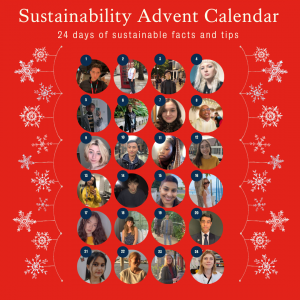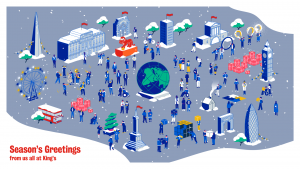 As part of our Sustainability Christmas Advent Calendar last year, we asked the King’s community for their top tip or fact around sustainability.
As part of our Sustainability Christmas Advent Calendar last year, we asked the King’s community for their top tip or fact around sustainability.
This is what they said:
“Our excessive eating habits during the festive season cause the same carbon footprint as a single car travelling 6,000 times around the globe, according to a University of Manchester study. This just seems absolutely mental to me!”
– Giacomo Ducato, KCL VegSoc President
“Oxfam is a great place to go for sustainable Christmas presents!”
– Rory Darling, King’s student
“The amount of rubbish produced by an average person in the UK per year is equivalent to 7 times their body weight.”
– Gordon Wong, KCL On The Streets Events Officer
“After Christmas approximately one billion cards end up in the bin, when they could be recycled.”
– Isy Clements, KCL Plant Society Vice-President
“Recycling one aluminium can can provide enough energy to run a TV for three hours.”
– Harshi Bhalla, King’s student
“Opt for a plant-based Christmas dinner. The livestock industry generates nearly 15% of all man-made greenhouse gas emissions. Plus, there are lots of meat alternatives around these days.”
– Asher Gibson, King’s student
“It’s estimated that we waste almost 270,000 tonnes of food each Christmas.”
– Amy Richardson, King’s student
“Wait until what you’re using is finished until you buy something new! It’s easy to get caught up in the sales and overbuy but try and shop more consciously this holiday.”
– Tasnia Yasmin, Sustainability Project Assistant
“For any student going home this Christmas with food left in the cupboards, download the app Olio, it’s an app for food-sharing, aiming to reduce food waste. It does this by connecting those with surplus food to those who need it.”
– Lily Hood, King’s student
“You can save used toothbrushes as common brushes, to clean the shoes or walls etc.”
– Damon Di, King’s student
“During the Christmas season the average family increases their spending on clothes by 43% and fast fashion companies produce more goods at lower prices to take advantage of this demand. Don’t get caught up in the fast fashion frenzy this Christmas!”
– Abigail Oyedele, King’s alumna
“You can use old newspaper to wrap presents rather than plastic wrapping paper, as it can’t always be recycled.”
– Caitlin Jackson, King’s student
“The equivalent of 2 million turkeys are thrown away every year. This blatant disregard for sentient life is insane to me!”
– Bethan Spacey, King’s student
“You can use fabric wraps for gifts instead of paper. Gift bags are also really good because you can reuse them.”
– Milo O’Farrell, King’s student
“You can create homemade edible gifts, e.g. I love brownies so would love getting a cute jar where someone has put in all the dry ingredients for me to make it. It’s cheap, thoughtful and low waste.”
– Ria Patel, President of KCL People & Planet
“Look at what you already have at home before you buy new Christmas decorations. Why not make your own DIY Christmas fruit decorations for your table using dried out oranges, or tie cinnamon sticks together for a tree decoration? Saving money, food, waste and the planet!”
– Eimar Helly, KCL EcoSoc Communications Officer
“Opt for vegan mince pies (they are really yummy) and a vegan meal this Christmas; donate half a portion of your food to the homeless instead of wasting it; switch to sustainable Christmas gift wrapping!”
– Chiyasmi Devi, King’s student
“My tip would be to look for a real Christmas tree that is FSC certified, sourced organically, and local to have the lowest carbon footprint if you celebrate Christmas.”
– Allie Marchand, KCL EcoSoc, Communications Officer
“You can make plant pots out of used tin cans! Rinse out the can, using a screwdriver poke a hole through the bottom and if necessary sand down the top edge of the can so it isn’t sharp, then plant a plant inside! I recommend some herbs for cooking and this saves waste and allows you to grow plants.”
– Rahul Goel, KCL Plant Society, President
“Check out @walkfree to see how to be conscious of modern slavery during the holidays.”
– Ishaan Shah, King’s student
“My tip is to go buy gifts from the local stores near you which will also help to support those stores, and instead of using plastic wrappers we can always use a paper bag or make one. Or we can take the gifts without wrappers too.”
– Dikshita Nath, King’s student
“Experiences are great gifts! They can be much more personal than material gifts. Think of inviting your friend / relative to a homemade meal, taking them to a cool event… Get creative!”
– Jone de Roode Jauregi, King’s alumna
“Why not buy your presents at a second hand/vintage store! You can find some unique and charming gifts there!”
– Helene Tessier, King’s student
“Cutting meat and dairy products from your diet could reduce your carbon footprint from food by up to 73 percent, so why not give Veganuary a go! “
– Emily Read, King’s student
Also read our blog post here with tips on gifts, wrapping paper, food, travel, trees, and energy.


